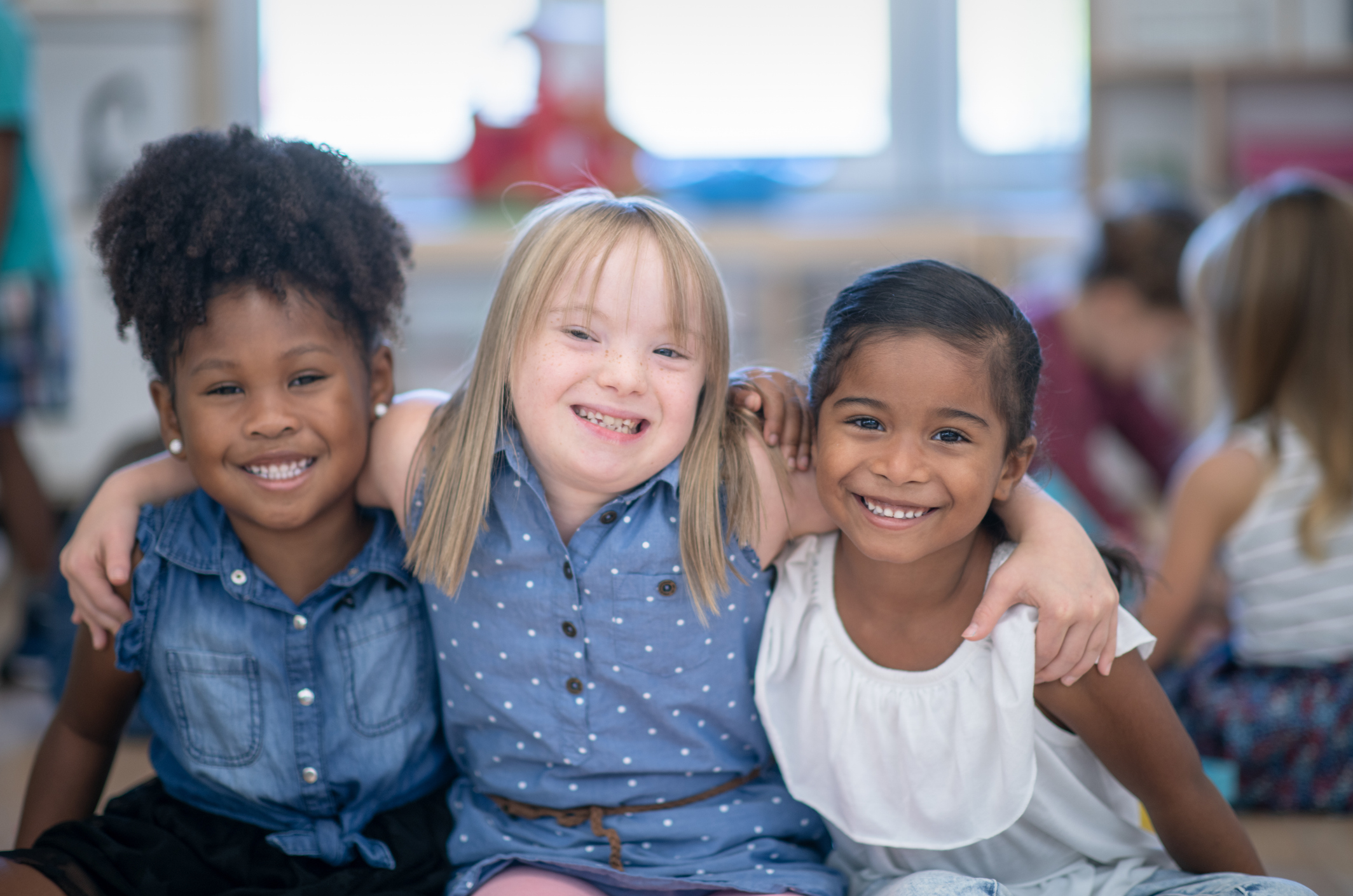Written by: Grace Sawyer
Inclusive programs are prevalent options for students (U.S. Department of Education, 2023). These programs enroll students with and without disabilities in the same classrooms with the same learning opportunities and use practices that support all student’s learning and development. Some families may question if an inclusive program is best for meeting their student’s needs. Practitioners can share with families the following benefits of enrolling their students in inclusive programs.
- Students develop respect for and an understanding of differences. Students naturally notice differences among members of society; this is a part of children’s development (i.e., they notice differences in size, hairstyles, etc.). When students without disabilities spend more time with their peers with disabilities engaged in positive activities, they regard these peers more positively (Favazza et al., 2016; Kart & Kart, 2021; Noggle & Stites, 2018). Also, with adult support, students without disabilities in inclusive programs can become more sensitive to disabilities (Diamond & Carpenter, 2000). Inclusion can foster acceptance of people with disabilities; this could reduce discrimination toward people with disabilities and other differences later in life as well.
- Students with and without disabilities experience academic success in inclusive programs. Staff within inclusive programs can and should support learning for all students, including students with and without disabilities (Kart & Kart, 2021; Nahmias et al., 2014; Szumski et al., 2022). For example, researchers in one study found that all students in similar inclusive classrooms made significant progress in literacy skills (Green et al., 2014). That is, students with and without disabilities in these classes learned literacy skills from the same curriculum in the same classroom. Other studies have shown that students with disabilities in inclusive programs perform better on academic measures than similar students in isolated special education programs (Strain & Bovey, 2011). In other words, all students can succeed academically in inclusive environments, with adult support.
- Students learn social-emotional skills and develop friendships. Students with and without disabilities can develop friendships in inclusive programs. In particular, students with disabilities benefit from peer and adult modeling and positive interactions with students without disabilities (Rivera & McKeithan, 2021). Studies show that in inclusive programs, students with disabilities learn social-emotional skills (e.g., initiating play interactions, turn-taking) more than in segregated programs (Odom et al., 2004). Students with disabilities also develop friendships in inclusive programs, though they may have fewer friendships than their non-disabled peers (Meyer & Ostrosky, 2016). Additionally, students without disabilities and students with disabilities interact together in inclusive programs (Yu et al., 2015), interactions that can only exist with inclusion.
One concern that some families have expressed is that enrolling students without disabilities in an inclusive program will cause them to receive less individualized attention and suffer academically. Several studies have provided evidence to disprove this claim (Kart & Kart, 2021; Noggle & Stites, 2018). Students without disabilities do not have poorer outcomes as a result of the presence of students with disabilities in their program (Noggle & Stites, 2018; Szumski et al., 2022; Warren et al., 2016). Practitioners can assure families that inclusive programs support the development of all students, across developmental domains, not just those with disabilities (Yang & Ostrosky, accepted for publication).
You can find links to helpful tip sheets and resources in this document.
References
Diamond, K. E., & Carpenter, E. S. (2000). Participation in inclusive preschool programs and sensitivity to the needs of others. Journal of Early Intervention, 23(2), 81-91.
Favazza, P. C., Ostrosky, M. M., & Mouzourou, C. (2016). The Making Friends program: Supporting acceptance in your K-2 classroom. Paul H. Brookes Publishing Co. Translated into Turkish (titled: Arkadaş Edinme)
Kart, A., & Kart, M. (2021). Academic and social effects of inclusion on students without disabilities: A review of the literature. Education Sciences, 11(1), 16.
Meyer, L. E., & Ostrosky, M. M. (2016). Impact of an affective intervention on the friendships of kindergarteners with disabilities. Topics in Early Childhood Special Education, 35(4), 200-210.
Nahmias, A. S., Kase, C., & Mandell, D. S. (2014) Comparing cognitive outcomes among children with autism spectrum disorders receiving community-based early intervention in one of three placements. Autism, 18, 311-320.
Noggle, A. K., & Stites, M. L. (2018). Inclusion and preschoolers who are typically developing: The lived experience. Early Childhood Education Journal, 46(5), 511–522.
Odom, S. L. Viztum, J., Wolery, R. A., Lieber, J., Sandall, S. R., Hanson, M., Beckman, P. J., Schwartz, I., & Horn, E. (2004). Preschool inclusion in the United States: A review of research from an ecological systems perspective. Journal of Research in Special Educational Needs, 4, 17-49.
Rivera, M. O., & McKeithan, G. K. (2021). High-Leverage Social, Emotional and Behavioural Practices for Students with Disabilities in Inclusive Settings. Educational Review, 73(4), 436–450.
Szumski, G., Smogorzewska, J., & Grygiel, P. (2022). Academic achievement of students without special educational needs and disabilities in inclusive education–Does the type of inclusion matter? PLoS ONE, 17(7), 1–19.
U.S. Department of Education, Office of Special Education and Rehabilitative Services, Office of Special Education Programs. (2023). 44th annual report to Congress on the implementation of the Individuals with Disabilities Education Act, 2022.
Warren, S. R., Martinez, R. S., & Sortino, L. A. (2016). Exploring the quality indicators of a successful full-inclusion preschool program. Journal of Research in Childhood Education, 30(4), 540-553.
Yang, H. W., & Ostrosky, M. M. (accepted). Preschool teachers’ perceptions of children’s learning: Above and beyond the impact of semi-structured, inclusive motor play activities. Early Childhood Education Journal.
Yu, S., Ostrosky, M., & Fowler, S. M. (2015). The relationship between children’s attitudes and play behaviors toward classmates with disabilities. Topics in Early Childhood Special Education, 35(1), 40-51.















